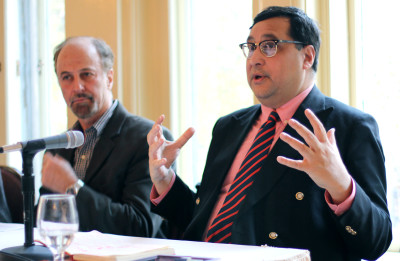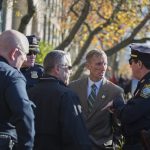
Solving climate change requires an understanding of the diversity of moral standards around the world, said a group of panelists at the “The Moral Case for Saving the Planet: Regional Perspectives” panel Monday.
The Boston University Global Programs and the Frederick S. Pardee School of Global Studies hosted the free panel as part of this year’s BU International Education Week. Approximately 30 BU community members gathered at the BU Castle to listen to the panel of six professors from Pardee, the College of Arts and Sciences and the School of Theology. The panel explored the challenges of climate change, from religion and culture to morals and points of view.
“Similarity is something that just cannot be assumed as a given and is something that we need to think about as in transit to … when it comes to climate change,” said Robert Hefner, an anthropology professor in CAS and the moderator of the panel.
Hefner also related the broader topic to a more local scale.
“Climate change is, on one hand, a global phenomenon, [but] regional perspective is something that can bring people in from parts of the world that sometimes was not urged in challenges, problems, issues that were dealt with at first,” he said.
The panel divided the issue into four regions: European perspective, African perspective, Eastern perspective and Southern perspective. Each represents a set of unique viewpoints on climate changes, the panelists said.
Henrik Selin, a professor of international relations in Pardee, said dealing with climate change in European regions can be understood as an act of welfare states sharing burdens.
“Europe is definitely one of the regions where climate change has penetrated the general consciousness,” Selin said. “There is a fair amount of awareness and wide-spread belief that climate change is a real challenge to the globe as a whole and Europe should take action. Environmental issues are well-embedded into welfare states, which can be translated into burden-sharing where the fortunate have the moral obligation to help out the less fortunate.”
James McCann, a professor of history in CAS, said the key solution to solving climate change in Africa is focusing on policymakers in industrial countries, or people who live off the land daily.
“When does the season change, when is it wet, when is it dry and how are we preceding changes to that, that’s [what climate change] means to Africa,” McCann said. “We have all seen agriculture in Africa, but some long-term traditions are changes by rapid interval climate instability.”
Robert Weller, a professor of anthropology in CAS, said traditional Daoism and Buddhism are influencing how Chinese and other eastern states deal with climate change. While these religions were not designed to adapt to climate change, they nevertheless became an important force in driving environmental movements, he said.
“Daoism has this concept of ‘wu wei,’ which is to do nothing and nothing shall be undone … It means not to go against the flow of the universe and the environment,” said Weller. “Buddhism encourages people to live simply, which is not giving up all at once, but little by little, simply it, such as becoming a vegetarian.”
Adil Najam, dean of Pardee, said the effort to fight climate change in the southern part of the world is also influenced by religion.
“There is a sense that the exotic East has something to do with the mystery between environment and people,” he said. “Religion does influence people’s reception of climate change. Population control is a good example. Religion told people to have kids, so people have kids. In countries like Indonesia, that is certain the common morality.”
Following the terrorist attacks in Paris over the weekend, Mary Moore, dean of STH, said during the panel that global conflict could make the fight against climate change much harder.
“The connection is not fully evident as we go forward, but they are there,” Moore said. “Every war, every act of violence, means [as much] to the Earth as it means to human family. We may not make the connection right now, but we must make them.”
Several attendees said the dialogue between panelists is a step towards the right direction.
Amanda Miller, the managing director of BU Global Programs, said students can benefit from a panel with diverse voices on climate change.
“For the past three years, Global Programs has hosted events to bring global conversations and discuss bigger topics.” Miller said. “The nice thing about this panel discussion is they have regional experts, so it’s not just from one perspective but from a global point of view, which is going to make the conversation very interesting.”
Sarah Eldredge, a junior in Pardee, said she was particularly interested in climate change in China, and the panel answered a lot of her questions.
“My regional focus is Asia, I think maybe we will see whether the Chinese ideology does matter … but there are many publicized environmental cases in China, so there is definitely a growth of environmental culture in China,” Eldredge said.
Samantha Catalfamo, a senior in Pardee and an executive board member of the BU Asian Studies Initiative, said after the panel she believes the BU community should also take more aggressive action to educate students on environmental issues.
“This is not something that just a small action can solve, we cannot recycle our way out the situation we created with the environment,” Catalfamo said. “So we should educate the whole body of the university and whole body of the nation to make [environmental issues] their own world dilemma.”




